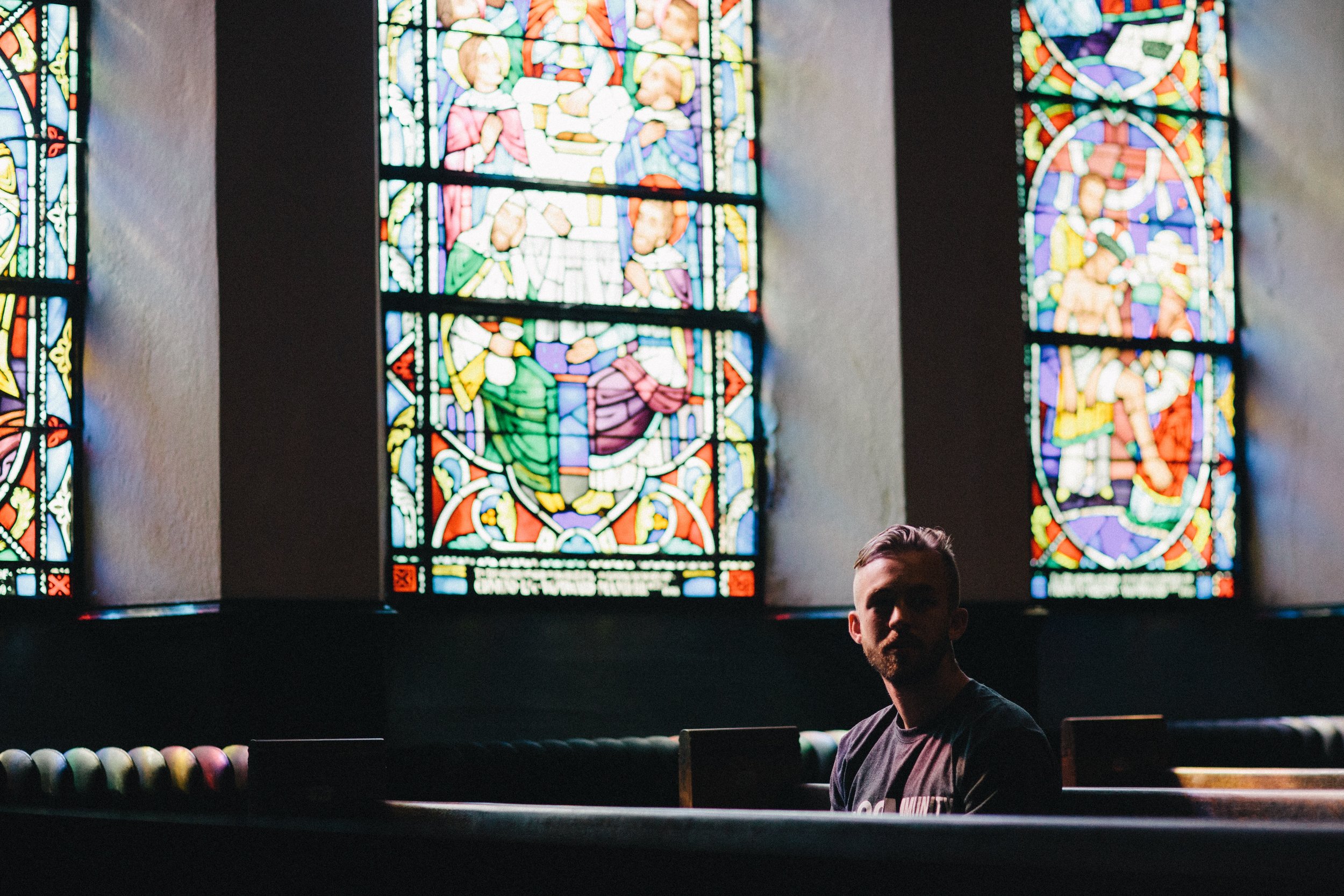(Image: Karl Fredrickson)
In her piece, “How to Be a Safe Space for the Same-Sex Attracted,” writer Rachel Gilson issues a guidance to Christians to help us respond to church members who disclose they are same-sex attracted. Gilson presents this matter as a high priority issue because she believes the same-sex attracted are actually more prevalent in the church than we know. Yet, for fear of “ugly assumptions...misunderstanding….and suspicion,” she says these individuals are often forced to remain in the shadows.
To remedy this issue, Gilson suggests the creation of “safe spaces”. A safe space, as she presents it, is an environment that fosters compassion, emotional support and a listening ear for the same-sex attracted. It is an environment that allows them to feel - well - safe to disclose with other church members their “inward battle” without fear. Quoting Galatians 6:2, Gilson encourages safe spaces that we may “bear each other’s burdens in love”.
Gilson’s tone is light and respectful throughout the article, and her charge seems noble enough. Yet, I came away from the piece feeling quite disturbed and in staunch disagreement with most everything she had to say. This is probably because everything Gilson said was largely rooted in her opinion rather than God’s Word. As such, as well-intended as her suggestions may be, Gilson’s call for “safe spaces” gives rise to a few problematic implications.
Here are three I believe are the most concerning.
(Image: Kristina Flour)
#1: “Safe Spaces” Facilitate Censorship
I agree with Gilson’s call for compassion toward those who struggle with same-sex attraction. But I am concerned that in calling for “safe spaces”, she only directs us to address a single side of this issue while obscuring and dismissing the other. Gilson goes through three points - offering step-by-step instructions along with suggestions for specific things to say and how to say them - to guide the church in responding to someone disclosing their same-sex attraction. Yet, she never tells us how to address this matter Biblically. Perhaps she’ll do so in a follow-up piece (?), because what she's presently suggesting is we censor and even mute ourselves, lest we inadvertently offend “while trying to hold to Scripture’s truth about sexual morality.” Gilson also encourages us to review LGBT-focused resources to help us better engage the same-sex attracted, and she calls us to repent for any “wrong” beliefs we may have about the subject.
“Ask the Spirit of God to help you identify false stereotypes you may hold,” she says.
Meanwhile, it doesn’t seem Gilson believes repentance is even necessary among the same-sex attracted (More on this later). And when a church member actually “comes out” to us, she suggests we keep our Bible speak to ourselves. “This is not the time to run a theological litmus test…,” she says.
Well, when is the time? And when that time comes, what do we say then?
Of course, Gilson doesn’t offer any specific insight in response to these inquiries. Everything is now more generic. “This conversation is the first of many you will have on this topic,” she says. “While you listen and love, pray for wise and compassionate words.”
I’m sorry, but I object.
Gilson went through great lengths to tell us how to create a “safe space” – according to her own opinion while encouraging us to read LGBT resources, no less. But there’s no room in a “safe space” to help them address and overcome their “struggles” according to God’s Word. She tells us to take the initiative to share in any “church context” all that we may learn from the suggested LGBT resources, but suggests we merely “listen and listen and listen” in conversations with the same-sex attracted. Gilson may not intend to do this, but she is suggesting the church grant special treatment for specific sin and she’s discouraging us from sharing God’s truth in the process. She’s implying the same-sex attracted need to be “safe” from Scripture. She's telling us to “bear one another’s burdens in love” but it appears she sees “bearing burdens” as nothing more than placation, and she defines “love” as anything that avoids confronting sin.
Jesus didn’t simply “listen and listen and listen,” neither did He reserve his “theological litmus test” for future conversations. He was compassionate while ALSO directly addressing sin and telling people God’s truth, as it is His mission to call sinners to repentance (Luke 5:32). It was out of compassion that He spoke with the woman at the well when it was unheard of for a man to even speak with a woman in public, let alone for a Jew to engage a Samaritan. But He also told her, in no uncertain terms, that she was in sin, patiently corrected her theological inaccuracies, and He went on to reveal to her who He truly is (John 4:18-26). He didn’t kick the can down the road. He lovingly told her the truth during that encounter.
Loving someone involves compassion AND telling them the truth – and we should do it when we have the opportunity.
“If someone comes out to you, recognize that this disclosure took incredible courage on their part and that you were picked because you seemed trustworthy,” Gilson states.
Praise the Lord! So that means they should trust the truth we share with them is coming from a place of love, and not hate. Moreover, anytime someone comes to us for faith-related matters, we should count it an opportunity from the Lord to be a faithful witness, and we should be trustworthy with His word. So if someone in our church “comes out” to us, we’d better take that opportunity to lovingly tell them the truth – right then and there.
For the Bible says: “Preach the word! Be ready in season and out of season. Convince, rebuke, exhort, with all longsuffering and teaching” (2 Timothy 4:2). “Behold, now is the accepted time; behold, now is the day of salvation” (2 Corinthians 6:2). And if that person is a brother who has stumbled, we who are spiritual should help them get back on track with a spirit of gentleness (Galatians 6:1).
Gilson’s call for compassion toward one disclosing his battle with same-sex attraction is to be applauded. But by suggesting we get our guidance for ministering to them from LGBT resources, asking us to edit our speech, and telling us when it is and isn’t appropriate to share God’s truth, I fear Gilson is encouraging the church to censor ourselves and engage according to her rules or those of the LGBT community’s, rather than God’s commands. This would greatly impede the work of the church. Compassion is always called for, but so is the truth. And if someone is a member of the church, we assume they sincerely want and expect to hear what God’s Word says.
(Image: Edward Cisneros)
#2: “Safe Spaces” Undermine the Gospel
According to Gilson, it is common for the same-sex attracted to hide this part of their lives for years because churches haven’t traditionally been “safe spaces” for them to "come out". But I’d suggest this dilemma has nothing to do with a lack of “safe spaces” and everything to do with a lack of the Gospel of Jesus Christ – either their churches aren't truly preaching it or the same-sex attracted have yet to truly accept it in their hearts.
The Gospel is the power of God unto salvation, and Jesus says we must be born again to see the kingdom of God (Romans 1:16; John 3). One who receives the Gospel is then born again, meaning they are indwelled with the Holy Spirit, who sanctifies us and guides us to all truth (John 16:13). Yet, for fear of offending the LGBT community, our culture, including many (alleged) churches, indulge them while also serving as a stumbling block to their coming to truly abide in Christ and His Spirit in them.
We dare use terms like “gay Christian” and describe some Believers as “same-sex attracted”. Meanwhile, it blasphemes the work of the Holy Spirit to suggest He indwells someone who is and remains disposed to unnatural affections. Further, we disingenuously present same-sex attraction as an "orientation”, implying their sin isn’t “sin” after all, but merely a state of being for which some lifestyle adjustments might be necessary. Our culture has long told the LGBT community that they’re in the clear for salvation as long as they are celibate. “Same-sex attraction isn’t a sin,” some argue. “It’s only a sin if they act on it!” Tell that to the man who committed adultery in his heart by merely looking at a woman with lust (Matthew 5:8). Tell that to the man who is a murderer because he hates his brother in his heart (1 John 3:15).
Same-sex attraction IS sin. All sin begins in the heart (Genesis 6:5; Proverbs 4:23; Matthew 5:19; Mark 7:21 and elsewhere). Sin is anything that runs counter to God’s good design and holy standard. Sin is the effect of humanity’s fallen, carnal state. Same-sex attraction runs counter to God’s good design for human sexuality. As such, the presence of same-sex desires (even if one doesn’t act on them) reveals a heart that remains unregenerate. These desires may feel “natural” and one may have them for years because he is still enslaved by the sin nature in which he was born – a nature all mankind inherited from Adam (Romans 5).
We do the LGBT community a grave disservice by telling them all they’ve got to do is not act on their urges - to take a lifetime vow of celibacy and commit to "the Bible's sexual ethic" as Gilson describes it. By spreading this lie we condemn them to fight this sin on their own, and we subject them to the heresy of a works-based salvation – which is no salvation at all (Ephesians 2:8-9). We’re setting them up to fail, as NO MAN is able to keep God’s law in his own strength (Romans 8:3). Indeed, we should all flee sexual immorality (1 Corinthians 6:18). But the mere act of fleeing doesn’t necessarily mean one is a new creature any more than doing good works automatically means one is saved.
The same-sex attracted must be born again. And we need to be sure we're giving them the WHOLE, balanced truth in the fullest context of God’s word. And the truth is, as taboo as it may be to say, homosexuality is an abomination to God and He will judge it accordingly. But thanks to the work of His Son, Jesus Christ, we are currently under the law of grace. Yet, this grace isn’t permission to remain in sin, but a free and loving opportunity to come out of it (Ephesians 2:8). Homosexuals (and every other sinner) have the opportunity to repent and believe the Gospel with all of their heart (Mark 1:15; Romans 10:9). And if they do that, they will be born again into the family of God (Acts 2:38; Galatians 4:4-7). The Holy Spirit will take residence in them and will rule their hearts, sanctifying them and guiding them OUT of their sin nature into all truth -– just like He does for anyone else who repents (John 16:13; Philippians 2:13; 1 Corinthians 6:11).
To be sure, the safest place to share this Good News with them is at church.
(Image: Isai Ramos)
#3: “Safe Spaces” are for the Old Man, not the New
Gilson portrays same-sex attraction as an ongoing struggle – an orientation that is a permanent state of being, rather than a sin over which one can be victorious.
“Your friend and Bible study partner who’s married with three kids might experience same-sex attraction," Gilson says. "The single guy who serves faithfully on the hospitality team might have known since he was little that his desires were different than other boys’. The elder’s wife who is every woman’s shoulder to cry on may weep privately about this struggle that just won’t go away.”
Yet God’s Word is clear that if any man be in Christ, he becomes a new creation. Old things pass away (2 Corinthians 5:17). We remain in our mortal bodies and thus continue to contend with sin in general. But we are no longer slaves to sin, and we certainly DO NOT “struggle” with the same particular sin forever. We’re not yet perfect, but WE ARE progressively being perfected, and as we grow we press toward the mark and leave our old ways, thoughts, desires, and speech behind (Romans 6:6; Philippians 3:12-13; 1 Corinthians 13:11). We are being transformed into the image of Jesus Christ from one degree of glory to another (2 Corinthians 3:18). So why do we believe an individual can be indwelled by the Holy Spirit and hold same-sex attractions long term or in perpetuity? Again, such a notion blasphemes the work of the Holy Spirit – rendering sanctification of no effect. If someone describes himself as a “same-sex attracted” Believer or a “gay Christian”, someone is lying - and it isn’t God the Father, the Son or the Holy Spirit. The Father draws us, the Son saves us, and the Holy Spirit guides us – but Gilson and others argue that we can remain the same?
Impossible!
Some even argue that “some sins take longer to overcome than others”. But that’s just not true if the Holy Spirit has made us aware of a given sin and we are faithful to heed His conviction. If it’s taking decades for us to overcome a given sin of which we are already aware, that says something about us, not the sanctification process. Either the same-sex attracted don’t actually believe their unnatural affections are, indeed, sin or they’re grieving the Holy Spirit (Ephesians 4). Certainly if there are others around them reinforcing the lie that they are fine as they are, they’ll ignore the Holy Spirit’s convictions all the more.
The church doesn’t expect to serve the perfect man. But it is designed to serve the new man, and the church’s purpose is to encourage his continual growth and maturity in Christ Jesus. Christ is Savior AND Lord, and He drives a distinct line in the sand - dividing the truth from a lie, the righteous from the unrighteous, good from evil, and the sheep from the goats. He tells us to make a choice.
If a man be in Christ, his new identity is in Christ. That man has heard and truly received the Gospel, and is now filled with the Holy Spirit, who washes us clean, guides us to all truth and is our guarantee for salvation (Titus 3:5; Ephesians 1:4; 2 Corinthians 1:22). But if the man clings to his old self, he is not in Christ. Thus he has no place in His church.
If the church must be a “safe space” for anything, let it be a safe space for the building up of the saints, rather than creating an environment to remain comfortable and coddled in our carnality. If a church member discloses his same-sex attraction, I’d imagine his intention is to seek the help he needs to be delivered, not remain as he is. So we should be loving enough to speak the truth in love, pray for him, and hold him accountable. Yet he must also be humble enough in heart to submit to the truth, as well as do the ongoing work necessary to renew his mind and grow in the grace and knowledge of Jesus Christ.
“Do you not know that the unrighteous will not inherit the kingdom of God? Do not be deceived. Neither fornicators, nor idolaters, nor adulterers, nor homosexuals, nor sodomites, nor thieves, nor covetous, nor drunkards, nor revilers, nor extortioners will inherit the kingdom of God. And such WERE some of you. But you were washed, but you were sanctified, but you were justified in the name of the Lord Jesus and by the Spirit of our God.”





